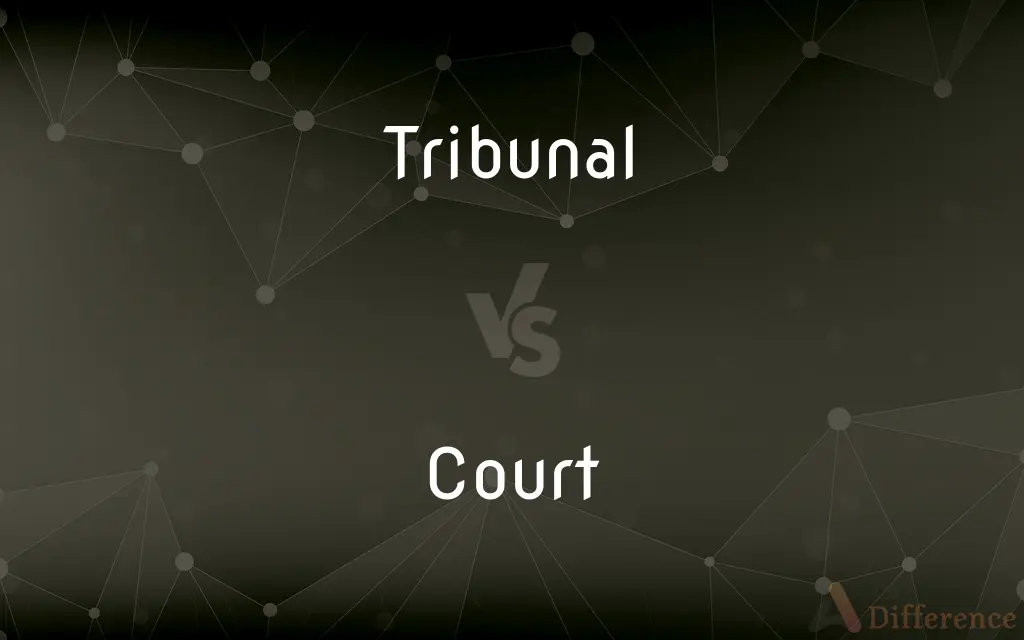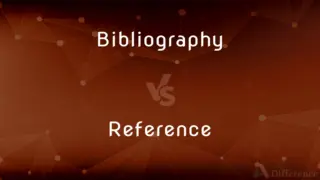Tribunal vs. Court — What's the Difference?
By Tayyaba Rehman — Updated on September 20, 2023
A tribunal is a specialized forum for specific issues; a court is a general judicial body for administering justice.

Difference Between Tribunal and Court
Table of Contents
ADVERTISEMENT
Key Differences
A Tribunal typically denotes a specialized forum established for addressing particular types of disputes or issues. These entities might not adhere to the strict procedural requirements of formal courts. For example, a labor dispute might be resolved in a labor tribunal where experts in labor laws preside.
In contrast, a Court represents the conventional judicial system, usually a component of the executive branch in many jurisdictions. Courts operate under strict procedural rules and often have a broad jurisdiction encompassing criminal and civil matters. For instance, a district court might hear both robbery cases and property disputes.
While both Tribunal and Court are invested with judicial authority, their origins can differ. Tribunals often emerge from administrative needs or specialized areas of law, focusing on swift and expert resolution. Courts, conversely, have a deep-rooted history in many legal systems, ensuring justice through established procedures.
Another differentiator is public perception. A Court decision, given its formal stature, is often perceived as more authoritative than a Tribunal decision. This doesn't undermine the validity of tribunal rulings but highlights the formality and tradition associated with courts.
In summary, while Tribunal and Court both play pivotal roles in dispute resolution, they differ in their areas of expertise, procedures, origins, and public perception.
ADVERTISEMENT
Comparison Chart
Function
Addresses specific issues or disputes.
General body for administering justice.
Procedural Rigidity
Often more flexible.
Strict procedural rules.
Origin
Emerge from specific needs or areas of law.
Deep-rooted in legal systems.
Jurisdiction
Limited to certain disputes.
Broad, covers criminal and civil matters.
Public Perception
Seen as specialized forums.
Viewed as formal and authoritative.
Compare with Definitions
Tribunal
Specialized forum for specific disputes.
The employment Tribunal ruled in favor of the dismissed employee.
Court
Judicial body for administering justice.
The Court sentenced the criminal to five years in prison.
Tribunal
May or may not have legal binding authority.
The decision of the rent Tribunal was binding on both parties.
Court
Follows strict procedural rules.
The evidence was dismissed by the Court due to procedural errors.
Tribunal
Established for swift resolutions.
The sports Tribunal quickly settled the athlete's doping dispute.
Court
Decisions often perceived as highly authoritative.
The Supreme Court's ruling was final and conclusive.
Tribunal
Often less formal than traditional courts.
The tax Tribunal allowed for a more relaxed presentation of evidence.
Court
A court is any person or institution, often as a government institution, with the authority to adjudicate legal disputes between parties and carry out the administration of justice in civil, criminal, and administrative matters in accordance with the rule of law. In both common law and civil law legal systems, courts are the central means for dispute resolution, and it is generally understood that all people have an ability to bring their claims before a court.
Tribunal
A tribunal, generally, is any person or institution with authority to judge, adjudicate on, or determine claims or disputes—whether or not it is called a tribunal in its title. For example, an advocate who appears before a court with a single judge could describe that judge as "their tribunal." Many governmental bodies that are titled as "tribunals" are described so in order to emphasize that they are not courts of normal jurisdiction.
Court
An extent of open ground partially or completely enclosed by walls or buildings; a courtyard.
Tribunal
A law court.
Court
Abbr. Ct. A short street, especially a wide alley walled by buildings on three sides.
Tribunal
The bench where a judge or other presiding judicial officer sits in court.
Court
A large open section of a building, often with a glass roof or skylight.
Tribunal
The place where a session of court is held.
Court
A large building, such as a mansion, arranged around a courtyard.
Tribunal
A committee or board appointed to adjudicate in a particular matter.
Court
The place of residence of a sovereign or dignitary; a royal mansion or palace.
Tribunal
Something that has the power to determine or judge
The tribunal of public opinion.
Court
The retinue of a sovereign, including the royal family and personal servants, advisers, and ministers.
Tribunal
(legal) An assembly including one or more judges to conduct judicial business; a court of law.
Court
A sovereign's governing body, including the council of ministers and state advisers.
Tribunal
A kind of village hall used to transact business, to quarter troops and travellers, and to confine prisoners.
Court
A formal meeting or reception presided over by a sovereign.
Tribunal
The seat of a judge; the bench on which a judge and his associates sit for administering justice.
Court
A person or body of persons that presides over the hearing of cases; a judge or panel of judges.
Tribunal
Hence, a court or forum; as, the House of Lords, in England, is the highest tribunal in the kingdom.
Court
The building, hall, or room where cases are heard.
Tribunal
In villages of the Philippine Islands, a kind of townhall. At the tribunal the head men of the village met to transact business, prisoners were confined, and troops and travelers were often quartered.
Court
The session at which cases are heard.
Tribunal
An assembly (including one or more judges) to conduct judicial business
Court
An ecclesiastical court.
Tribunal
Derived from administrative or specialized needs.
The veterans' benefits Tribunal addresses issues faced by former soldiers.
Court
(Sports) An open level area marked with appropriate lines, upon which a game, such as tennis, handball, or basketball, is played.
Court
The body of directors of an organization, especially of a corporation.
Court
A legislative assembly.
Court
To attempt to gain; seek
Courting wealth and fame.
Court
To behave so as to invite or incur
Courts disaster by taking drugs.
Court
To try to gain the love or affections of, especially to seek to marry.
Court
To attempt to gain the favor of by attention or flattery
A salesperson courting a potential customer.
Court
(Zoology) To behave so as to attract (a mate).
Court
To pursue a courtship; woo.
Court
(Zoology) To engage in courtship behavior.
Court
An enclosed space; a courtyard; an uncovered area shut in by the walls of a building, or by different buildings; also, a space opening from a street and nearly surrounded by houses; a blind alley.
The girls were playing in the court.
Court
A street with no outlet, a cul-de-sac.
Court
A housing estate under the House Ownership Scheme.
Court
An apartment building, or a small development of several apartment buildings.
Court
(social) Royal society.
Court
The residence of a sovereign, prince, nobleman, or other dignitary; a palace.
The noblemen visited the queen in her court.
Court
The collective body of persons composing the retinue of a sovereign or person high in authority; all the surroundings of a sovereign in his regal state.
The queen and her court traveled to the city to welcome back the soldiers.
Court
Any formal assembling of the retinue of a sovereign.
Court
Attention directed to a person in power; behaviour designed to gain favor; politeness of manner; civility towards someone
Court
(law) The administration of law.
Court
The hall, chamber, or place, where justice is administered.
Many famous criminals have been put on trial in this court.
Court
The persons officially assembled under authority of law, at the appropriate time and place, for the administration of justice; an official assembly, legally met together for the transaction of judicial business; a judge or judges sitting for the hearing or trial of cases.
The court started proceedings at 11 o'clock.
Court
(often capitalized) The judge or judges or other judicial officer presiding in a particular matter, particularly as distinguished from the counsel or jury, or both.
Court
The session of a judicial assembly.
The court is now in session.
Court
Any jurisdiction, civil, military, or ecclesiastical.
Court
(sports) A place arranged for playing the games of tennis, basketball, handball, badminton, volleyball, squash and some other games
The local sports club has six tennis courts and two squash courts.
The shuttlecock landed outside the court.
Court
One of the two divisions of a tennis, badminton or volleyball court, in which the player or players of each team play
Court
(transitive) To seek to achieve or win.
He was courting big new accounts that previous salesman had not attempted.
Court
(transitive) To risk (a consequence, usually negative).
He courted controversy with his frank speeches.
Court
(transitive) To try to win a commitment to marry from.
Court
(transitive) To engage in behavior leading to mating.
The bird was courting by making an elaborate dance.
Court
(transitive) To attempt to attract.
Court
(transitive) To invite by attractions; to allure; to attract.
Court
(transitive) To attempt to gain alliance with.
Court
(intransitive) To engage in activities intended to win someone's affections.
She's had a few beaus come courting.
Court
(intransitive) To engage in courtship behavior.
In this season, you can see many animals courting.
Court
An inclosed space; a courtyard; an uncovered area shut in by the walls of a building, or by different building; also, a space opening from a street and nearly surrounded by houses; a blind alley.
The courts of the house of our God.
And round the cool green courts there ran a rowOf cloisters.
Goldsmith took a garret in a miserable court.
Court
The residence of a sovereign, prince, nobleman, or other dignitary; a palace.
Attends the emperor in his royal court.
This our court, infected with their manners,Shows like a riotous inn.
Court
The collective body of persons composing the retinue of a sovereign or person high in authority; all the surroundings of a sovereign in his regal state.
My lord, there is a nobleman of the court at door would speak with you.
Love rules the court, the camp, the grove.
Court
Any formal assembling of the retinue of a sovereign; as, to hold a court.
The princesses held their court within the fortress.
Court
Attention directed to a person in power; conduct or address designed to gain favor; courtliness of manners; civility; compliment; flattery.
No solace could her paramour intreatHer once to show, ne court, nor dalliance.
I went to make my court to the Duke and Duchess of Newcastle.
Court
The hall, chamber, or place, where justice is administered.
Most heartily I do beseech the courtTo give the judgment.
Court
The session of a judicial assembly.
Court
Any jurisdiction, civil, military, or ecclesiastical.
Court
A place arranged for playing the game of tennis; also, one of the divisions of a tennis court.
Court
To endeavor to gain the favor of by attention or flattery; to try to ingratiate one's self with.
By one person, hovever, Portland was still assiduously courted.
Court
To endeavor to gain the affections of; to seek in marriage; to woo.
If either of you both love Katharina . . . Leave shall you have to court her at your pleasure.
Court
To attempt to gain; to solicit; to seek.
They might almost seem to have courted the crown of martyrdom.
Guilt and misery . . . court privacy and solitude.
Court
To invite by attractions; to allure; to attract.
A well-worn pathway courted usTo one green wicket in a privet hedge.
Court
To play the lover; to woo; as, to go courting.
Court
An assembly (including one or more judges) to conduct judicial business
Court
The sovereign and his advisers who are the governing power of a state
Court
A specially marked area within which a game is played;
Players had to reserve a court in advance
Court
A room in which a law court sits;
Television cameras were admitted in the courtroom
Court
A yard wholly or partly surrounded by walls or buildings;
The house was built around an inner court
Court
The residence of a sovereign or nobleman;
The king will visit the duke's court
Court
The family and retinue of a sovereign or prince
Court
A hotel for motorists; provides direct access from rooms to parking area
Court
Australian woman tennis player who won many major championships (born in 1947)
Court
Respectful deference;
Pay court to the emperor
Court
Make amorous advances towards;
John is courting Mary
Court
Seek someone's favor;
China is wooing Russia
Court
Engage in social activities leading to marriage;
We were courting for over ten years
Court
Authority spans over criminal and civil matters.
The Court heard both the burglary case and the property dispute.
Court
Integral to the legal system of a jurisdiction.
The Court plays a pivotal role in upholding the rule of law.
Common Curiosities
What's higher, a Court or Tribunal?
A Court, especially higher courts, usually holds more authority and can sometimes review or override Tribunal decisions.
Are all Tribunal decisions legally binding?
Not always. The binding nature of a Tribunal's decision varies based on its jurisdiction and mandate.
Do Courts always have juries?
No, not all Court cases involve juries. It depends on the jurisdiction and nature of the case.
Can someone represent themselves in a Tribunal?
Yes, in many Tribunals, individuals can represent themselves, although legal representation is often advisable.
How is a Court judge different from a Tribunal adjudicator?
A Court judge typically has broader legal training, while a Tribunal adjudicator might be an expert in a specific field.
Can Tribunal decisions be appealed in a Court?
Often, yes. Many Tribunal decisions can be appealed in a higher Court if procedural or legal errors are alleged.
Are Tribunals found internationally?
Yes, there are international Tribunals, like those for war crimes or maritime disputes.
Share Your Discovery

Previous Comparison
Bibliography vs. Reference
Next Comparison
Millionaire vs. BillionaireAuthor Spotlight
Written by
Tayyaba RehmanTayyaba Rehman is a distinguished writer, currently serving as a primary contributor to askdifference.com. As a researcher in semantics and etymology, Tayyaba's passion for the complexity of languages and their distinctions has found a perfect home on the platform. Tayyaba delves into the intricacies of language, distinguishing between commonly confused words and phrases, thereby providing clarity for readers worldwide.
















































